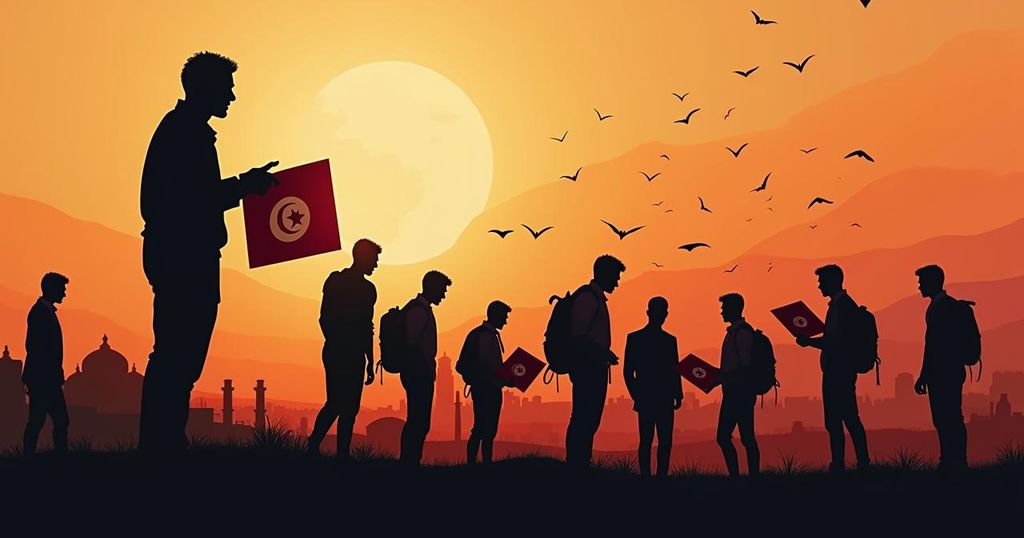Political Repression and Low Voter Turnout in Tunisia’s Presidential Election

Tunisia’s recent presidential election showcased a significant political crackdown, leading to low voter turnout. Incumbent President Kais Saied encounters minimal opposition due to the imprisonment or exclusion of major rivals. With ongoing economic struggles and the perception of illegitimacy surrounding the electoral process, the election reflects deeper issues within Tunisia’s democracy and governance.
Tunisia recently held a presidential election, yet the atmosphere surrounding the event was marked by significant political repression, resulting in exceptionally low voter turnout. Incumbent President Kais Saied faces little opposition, as major rivals remain either imprisoned or excluded from the ballot. His first term began five years ago amidst widespread anti-establishment sentiments, and this election represents the third since the 2011 protests that led to the ousting of President Zine El Abidine Ben Ali, the first of several Arab Spring leaders to be removed from power. Historically, Tunisia has been seen as a success story following the Arab Spring, establishing a democratic constitution and winning a Nobel Peace Prize for its civil society’s efforts to mediate political discord. Unfortunately, new leaders failed to address economic challenges, leading to increased political strife. President Saied’s re-election will provide insights into current public sentiment regarding the trajectory of Tunisia’s democracy, especially since eliminating much of the political opposition began with his consolidation of power in July 2021, which many called a coup. His administration’s harsh actions towards dissenters, including journalists and political figures, continued to pave the way for the election taking place under a veil of political apathy and repression. Only three candidates were officially approved to run: Saied, Zouhair Maghzaoui, and Ayachi Zammel, while many others were incarcerated or barred from participation. Opposition parties have denounced the election as illegitimate, highlighted by the imprisonment of notable party leaders and widespread calls for a boycott. Meanwhile, Tunisia’s economy faces severe issues, including unemployment rates as high as 16%, compounded by slow growth and reliance on international financial support. Economic conditions have led to increasing attempts by Tunisians to migrate illegally to Europe. Saied’s administration has simultaneously taken a hard stance against migrants from sub-Saharan Africa, intensifying the humanitarian crisis along Tunisia’s coast. Internationally, Tunisia maintains its historical alliances while exploring new partnerships under Saied’s leadership. However, despite recent warming ties with countries like Iran and increased cooperation with China, Western nations remain Tunisia’s primary trading partners, focusing on managing migration amidst ongoing political challenges.
The political landscape in Tunisia has shifted dramatically since the Arab Spring, leading to significant challenges and opportunities for democracy in the region. Following the revolution in 2011, Tunisia emerged with an optimistic democratic backdrop and a new constitution, distinguishing itself as a beacon of hope in the Arab world. However, the inability of successive governments to effectively manage economic distress and the political aspirations of the populace has led to widespread dissatisfaction. The ascendance of Kais Saied in 2019 marked a critical juncture; his consolidation of power through controversial political maneuvers has drawn international scrutiny and raised alarms among pro-democracy advocates. As the nation approaches another presidential election, the outcomes surrounding voter engagement and opposition participation signal a troubling trend ahead.
In summary, the recent presidential election in Tunisia highlights the profound challenges facing the country’s democracy amidst political crackdowns and economic struggles. With significant opposition silenced and an electorate wary of the electoral process’s legitimacy, the upcoming term for President Kais Saied remains laden with uncertainty. The intertwined crises of governance, economy, and societal discontent symbolize a pivotal moment for Tunisia, potentially reshaping its future trajectory and engagement within the international landscape.
Original Source: www.euronews.com







